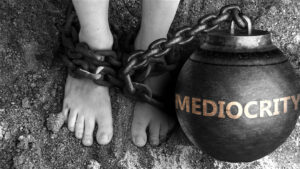Blog

Breaking the “Trance of Unworthiness”
Many of us are walking around in a “trance of unworthiness.” It’s a gnawing feeling that we’re deeply flawed. It tells us we’re not worthy of love, happiness, success, or approval. And it follows us around like a shadow. When I first encountered this provocative term from psychologist and author Tara Brach, it felt like a revelation to me, because I’ve seen it in so many of my colleagues, clients, and students. And because I’ve felt it at times too. Brach describes it as “fear or shame—a feeling of being flawed, unacceptable, not enough. Who I am is not okay.”

Getting Good at Overcoming Fear
Fear. A terrible feeling. Something to avoid. Right? Not so fast. Fear can actually be turned into a powerful asset and opportunity, if understood and addressed properly. Can we get good at overcoming fear? First, what is it? Fear is a feeling of distress or dread caused by a sense of impending danger or pain. It’s a powerful, primitive emotion. A warning that we need to pay attention. We need fear to survive, and it has served us well through the ages. But it can also be one of the biggest obstacles in our lives. We can go through our

Burnout and the Great Resignation
Burnout has been a big problem for millions of people for a long time now. And it’s getting worse. Burnout is also affecting more young people. And the pandemic, with all the extra stressors and pressures it’s brought to so many, is aggravating the burnout problem. These are major ingredients of the “great resignation.” What is burnout? According to the Mayo Clinic, job burnout is “a special type of work-related stress—a state of physical or emotional exhaustion that also involves a sense of reduced accomplishment and loss of personal identity.” When we’re burned out, we feel run-down and exhausted or empty.

Beware the Disease of More
More isn’t always better. Let that sink in. More ≠ better. Yet our brains fool us into thinking that it is. It’s an unconscious assumption, deep in our brains, that’s nearly impossible to shake. It’s the idea that if we get more of the things we think we want, we’ll be happier. But it’s a lie. More what? More of pretty much everything: Success. Money. Status. Skills. Achievements. Victories. Conquests. Beauty. Followers. Honors. Devices. Shoes. Goals. Projects. More whatever. You name it. The disease or more. We’re seduced by the possibility of the next thing. Seduced by the chase. Here’s

Golden Handcuffs: Stuck in a Job You Don’t Like?
Stuck in a job you don’t like? Enduring it? Too often, we do it for the money, the security, or the prestige, but not for its intrinsic value. We stick it out, trapped by golden handcuffs. Golden handcuffs are financial incentives designed to keep workers at an organization. We may long to leave a job and set out on a new adventure, but the thought of giving up the salary, bonus, or other perks makes us stay. It helps to view it from our own perspective. Sometimes we place the golden handcuffs on ourselves. They can come in the form

Are You Trapped by Success?
Are you trapped by success? It’s an odd question. How can success be a trap? Is that even possible? Turns out it can be a big trap. Below are 15 quick ways. 1. Addicted to Success In a culture that worships success, we can become obsessed by it. It can consume most of our waking hours, and most of our waking thoughts. It can become a compulsive drive. We can build our lives around the pursuit of success. But what is success, actually? Have we taken the time to define what it means for us, in our current chapter

The Conformity Trap
One of the biggest traps we face as we make decisions about life and work is the trap of conforming to societal expectations or conventional paths instead of blazing our own path in life. Call it the conformity trap. Conformity entails behaving in ways similar to others or according to their wishes, instead of relying on our own judgment or preferences. We see this all time. We tend to mirror the body language and communication styles of our peer groups. Our penchant for conformity comes from a strong desire to fit in with the group. It can be conscious or

Is Your Identity Wrapped Up Too Much in Your Work?
Work is a big part of our lives. It’s essential to our income and security, and it can be a source of meaning and satisfaction. But there are dangers with having our identity too wrapped up in our work. What happens if we’re laid off? Or in-between jobs? No longer able to do that kind of work? Retired? We’re vulnerable to an identity crisis and a downward spiral when the work that animates our identity disappears or changes. “Avoid having your ego so close to your position that when your position falls, your ego goes with it.” -Colin Powell, U.S.

What We Can Learn from the Olympics about Life and Leadership
With the Olympics underway—with all the competition, drama, and intrigue—what can we learn from them not only about excellence and teamwork but also about life and leadership? Sure we admire the grueling physical feats and the mental preparation. The years of punishing practices, discipline, focus, and skill-building that go into the nine-second sprint, the epic overtime soccer match, or the attempt to shatter records. Part of what’s great about the Olympics is the quest for excellence—and the occasional flash of it that electrifies the world. “Excellent” is one of the three components of our “triple crown leadership” model (the others

The Mental Prisons We Build for Ourselves
“Our life is what our thoughts make it.” –Marcus Aurelius, Meditations Though we like to think of ourselves as free, many of us are confined to a mental prison we’ve built for ourselves. Our most vicious jailer is our unhealthy “self-talk”—our inner critic that savagely sabotages us with haunting doubts and harsh judgments. We’re our own worst enemy. We’re a prisoner of our “monkey mind”—feeling unsettled or restless and easily distracted by thoughts that bounce around like agitated apes. Often, we’re dwelling on the past or worrying about the future—always neglecting the present moment. Most of our mental prisons are

Do You Have Margin in Your Life?
Many of us are always “on” these days, running from task to task. Never-ending demands. Frenetic pace. We fill every available moment with activity or scrolling through our digital feeds. The problem: We don’t have enough margin in our lives. Young hustlers making it happen. Working parents managing the household. Climbing the corporate ladder or growing our small business or nonprofit. Perpetual busyness. It feels heavy always going at this pace. We get exhausted. It’s not common to talk and think in terms of margin in our lives. But it’s needed now more than ever. A margin is the border

The Trap of Deferring Dreams and Postponing Happiness
One of the most common—and costly—traps of living is the trap of deferring dreams and postponing happiness. We do it, we tell ourselves, because it’s not practical or “the right time.” So what happens in the meantime? We endure work without enjoying it. Or we suffer through the days. We become resigned to the dysfunctions of our work, and habituated to its anxiety and stress. Or we sacrifice health, family, and dreams for the job. We neglect precious relationships with family and friends with the rationalization that we’ll make up for it later. We wait. Hmmm…. Deferring Dreams: Waiting

The Trap of Caring Too Much about What Other People Think
We humans are social animals. We’re wired to think about our role in the group and about how others think of us. It matters in our families, friendships, and work relationships. We can’t survive and thrive without tending to these relationships. But there’s also a big trap here. The problem is when we’re so influenced by what others think—or, to be precise, what we think others will think—that it causes us to make choices that won’t serve us well over time. We avoid the short-term pain of a possible loss in status in exchange for the long-term loss of missing

Tired of Settling? How to Light Your Life and Work on Fire
Settling for “good enough” instead of what you really want? Getting comfortable with the ordinary? Letting others treat you poorly? Suffering through a poor work situation? Tired of working with people who don’t want to excel or don’t share your values? Playing small, even though you know there’s something bigger possible for you? Time out. This is your life. Your one and only life, with an uncertain duration and no guarantees. Time to take it back. “There is no passion to be found playing small—in settling for a life that is less than the one you are capable of living.”

The Problem of Going It Alone
One of the silver linings of the covid-19 pandemic was what it reminded us about our longing for relationship, for connection, for human touch. What was suddenly stolen was dearly missed and now cherished. We see the problem of going it alone. Close connection with family and friends and a sense of belonging are the most important building blocks of a life well lived. Yet today we have forces driving us apart. One is a culture of excessive individualism and egocentric living, a sense that life is all about us. It’s the trap of being self-absorbed and caught up in

